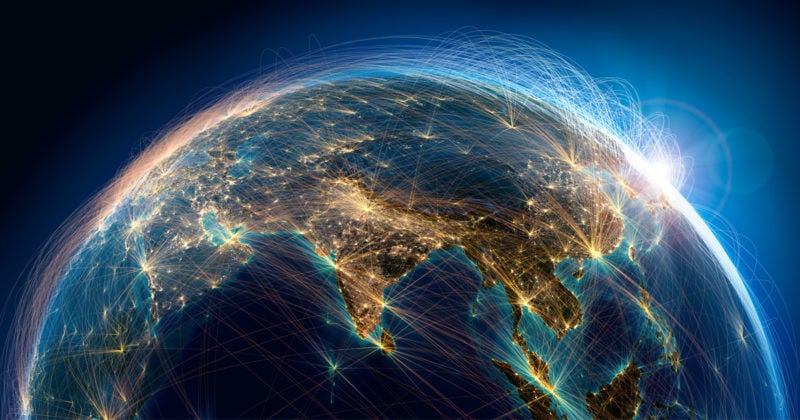全球連結凝聚我們 — 我們需要更多交流,而不是更少

今天有許多人對於全球化的復甦、充滿敵意的經濟封鎖、供應鏈縮短、製造業返鄉及重要國內產業擴張感到疑慮。
在疫情期間,悲觀主義者及全球化批評者獲得支持,這一點兒也不令人意外;過去對全球連結感到質疑的人,現在找到了新理由。不過,我們還是可以理解,今天有許多人對於全球經濟的未來感到憂心。
我們正處於嚴重危機中。世界經濟因為新冠病毒疫情急遽下滑,看起來比2008年全球金融危機更慘烈,根據世界貿易組織(WTO)公布今年全球貿易衰退程度可能高達今年的1/3。
有關資本流的預估也相去不遠,預期2020/21年來自海外的直接投資將減少達3成至4成。跨國旅行也受到重創。今年的國際航空乘客預期減少15億人次。疫情的前述及其他影響,迫使許多個人、公司及產業面臨嚴峻的挑戰。
國際貿易免疫系統獲得強化
儘管2020年展望黯淡,但我不認為疫情過後,全球連結會出現永久的大幅衰退。我認為全球化會再度復甦,即使是最悲觀的情境,也不見貿易及資本流崩盤。
預估的衰退反而會恢復到2000年,被當時普遍認為是「超全球化」的現象。與此同時,許多地方爆發疫情,讓我們更加體悟到,全球化對我們的經濟及社交「免疫系統」有多麼重要。
在這此危機當中,許多活躍的全球性公司發現,相較於僅聚焦國內或區域市場的公司,他們處於更有利的地位。這非常有道理:僅活躍於單一國家的公司,只能依賴地方情況定生死;從另一方面來看,進軍許多國家版圖的公司反而更強大、更有彈性。
例如在疫情危機發生初期,在中國營運的全球公司覺得被第一波封城拖累。但初期所處的不利位置反而在後來成為優勢,隨著中國從疫情復甦,當地營運的公司已開始恢復營收。當然,每個產業各不相同,但國際性的企業在此時此刻通常展現較強大的恢復力。
採取開放心態以保不受影響
出於類似的原因,我也認為,許多要求增加國內製造業和經濟部門再國有化的呼籲都是錯誤的。國家供應鏈不一定更具彈性。如果有的話,未來供應鏈將需要更加多元化,這意味著更多的全球化,而不是更少。 採取預防措施並為緊急情況建立關鍵物資的戰略儲備當然是有意義的。但我們不要忘記,全球分工對於繁榮仍然至關重要。例如,如果每個國家都生產自己的醫療產品,這將毫無意義——而且從長遠來看是負擔不起的。 我毫不懷疑,面對危機,開放、多元化的社會最終會變得更加強大。目前,我們需要全球互聯的研究和來自世界各地的最佳醫學知識,以幫助控制這種病毒。我們需要更多的跨境合作,例如共享免費重症監護能力或向其他國家派遣醫生團隊。
採取預防措施並為緊急情況建立關鍵物資的戰略儲備當然是有意義的。但我們不要忘記,全球分工對於繁榮仍然至關重要。例如,如果每個國家都生產自己的醫療產品,這將毫無意義——而且從長遠來看是負擔不起的。
事實上,危機前設置的障礙,例如醫療產品的關稅,現在有可能加劇供應瓶頸。碰巧的是,今天出口限制和進口關稅的糾葛適用於目前非常重要的許多醫療保健和衛生用品。
我對更加開放的呼籲更適用於較貧窮的地區,其中一些地區剛剛開始感受到 Covid-19 危機的影響。在這裡,進入世界市場也意味著更大的彈性。例如,對於本地銷售停滯的小企業和微型企業家來說,電子商務(包括跨境運輸)提供了一線希望。當然,這需要有利的環境,包括現代海關程序和減少邊境官僚主義。多年來,DHL 一直與國際合作夥伴合作,在該領域提供支持。
危機中的一點常態
今天,我們都親身體驗到我們的福祉在多大程度上依賴於貿易、運作良好的物流和全球數字連接。
想像一下,如果沒有先進的電子商務系統,沒有強大的全球 IT 基礎設施,沒有連接我們的技術、平台和智能手機,這場流行病在幾十年前會如何發展。所有這些成就使我們能夠比過去保持更多的連續性。
如今,許多員工還可以選擇在家庭辦公室與同事和客戶進行遠程工作。管理人員可以聚集在一起做出業務決策,而不必身在一個地方。家人、親戚和朋友可以保持密切聯繫,而無需親自見面。即使在孤立的情況下,我們也可以獲得無限量的數字知識、信息和娛樂。電子商務與最先進的物流相結合,已成為當今的重要生命線。
我堅信,全球連通性使我們的世界在當前的危機中更加穩定和脆弱。我們應該對此心存感激。為了世界社會和經濟“免疫系統”的利益,我們必須確保全球化不會遭受無法彌補的損害。我們做得越好,我們就越有彈性,危機過後我們也就越容易重新提速。








 繁體中文(台灣)
繁體中文(台灣)